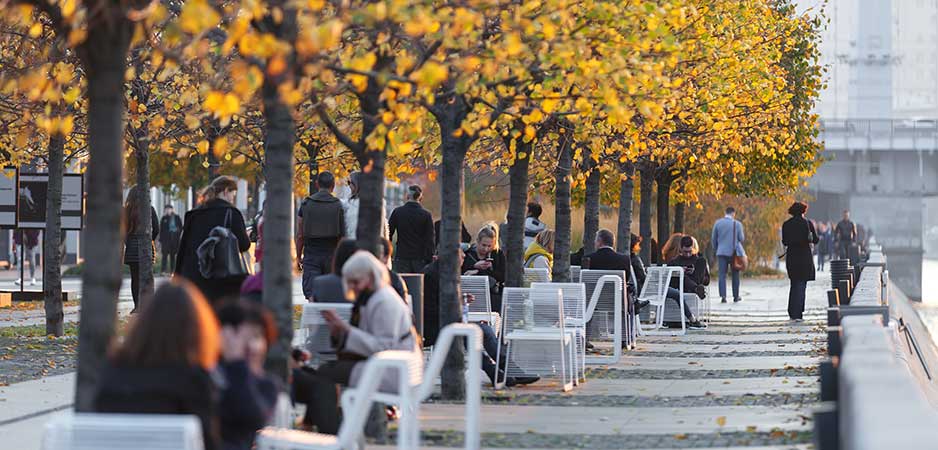Russia has published the full results of opinion polls regarding xenophobia, including attitudes toward LGBTQ people in 2018 and the first half of 2019. If we supplement it with data on hate crimes, a clearer picture of the level of tolerance in Russian society today emerges. This information is interesting in connection with the ambiguous forecasts by experts regarding the growth of radicalism in Russia following a partial decriminalization of Article 282 of the criminal code, which addresses incitement to hatred in December 2018, when criminal prosecution was replaced by an administrative fine.
Firstly, we still have disappointing data when it comes to the fear of immigrants. The negative attitude of Russians toward migrants remains high, and has in fact increased. In general, between 63% and 67% of Russians, according to polls conducted by the Levada Center for public opinion research in August 2018 and by a Telegram channel in July 2019, view migrants negatively. The total number of migrants in Russia is just over 7% of the total population of the country.
Thus, we can state that the current level of migrant-phobia is between 5% to 9% higher than in 2017. It is interesting that the All-Russian Center for the Study of Public Opinion (VTsIOM), well known for closer ties to the government, gives an even higher figure — 78%. Experts largely associate this growth with events in Yakutia, where the rape of a Yakut girl by a Central Asian migrant has caused massive unrest in March this year.
Gaging Public Opinion
The events in Yakutia, as well as the mass protests against Roma in the village of Chemodanovka, in the Penza region, in June, where an ethnic Russian was killed by the Roma in a domestic fight, led to a sharp increase in the percentage of respondents who saw mass ethnic clashes as a possible occurrence. By the time the Levada report was conducted, this number has grown markedly. Now, 31% of respondents think confrontation is a possibility, versus 19% in 2017, although after Russia’s annexation of Crimea in 2014 this figure has been on a constant decrease. However, only 15% of respondents (8% in 2017) think there is a possibility of such clashes in the areas where they live.
Most experts also agree with the assessment of attitudes toward LGBTQ people in Russia. In May this year, the Public Opinion Foundation (POF) and the Levada Center conducted parallel studies on Russian attitudes toward homosexuality. Surprisingly, their conclusions almost coincided. More than half (55% and 56% respectively) of respondents said they had a negative attitude toward people with a different sexual orientation.
Moreover, according to the POF, 51% of respondents said that they would stop communicating with their friends if they found out that they identified as LGBTQ; among the Levada respondents, 49% said this. In addition, according to the Levada data, only 47% agree that homosexuals have the same rights as heterosexuals, while 25% believe that they must be treated differently from everyone else.
However, it should be noted that the situation with the attitude toward LGBTQ people in Russia as a whole has improved since in 2015, when the last report was conducted. The number of respondents in 2015 who were more or less negative or wary of homosexuals was 65%. Today, 39% say sexual orientation plays no role in their opinion of someone. However, the percentage of respondents who approve of homosexuality remained the same — 3%.
It is interesting that according to the Levada Center, 46% of Russians have a negative view negatively of representatives of various religious sects, by which they understand first of all Jehovah’s Witnesses. This is most likely due to negative representation of the activities of this group in the media in 2017-18.
Interethnic Relations
Regarding interethnic relations, various Russian sociological centers unfortunately gave diametrically opposite assessments. The Levada Center recorded a sharp increase in xenophobia among Russians in August 2018. The Public Opinion Foundation, which conducted its study in December last year, presented the opposite conclusion that the last years have seen a trend toward a gradual decrease in xenophobia.
Thus, according to the Levada data, those who wanted to limit the number of Roma living in Russia increased by 15% compared to 2017, up to 32% in 2018, and of Jews by 8%, now at 12%. In relation to immigrants from former Soviet Central Asian republics — Uzbekistan, Kyrgyzstan, Tajikistan and Turkmenistan — fear grew by 7% (25% in 2018 against 19% in 2017 ), of the Chinese by 16% (31% in 2018 against 15% in 2017), and immigrants from the Caucasus by 1% (23% in 2018 against 22% in 2017).
In May 2019, Levada informed us that the number of those who viewed Caucasians and immigrants from Central Asian countries negatively was at 19%. But, at the same time, 28% of respondents do not want any restrictions on immigration.
However, according to the POF December 2018 poll, the number of xenophobic responses in relation to various ethnic groups as a whole did not exceed 14%, of which 3% negatively related to immigrants from the Caucasus, Tajiks and Uzbeks, and only 1% to Roma and Chinese. The study concluded that 82% of Russians are tolerant of their neighbors, and only 7% have ever experienced discrimination and insults related to their ethnicity.
It is unlikely that such a sharp drop occurred in the mood among the Russians in just the four months between the polls. Most likely, the reason lies in the methodology used in the studies. The methods used in the Levada report are more specific in determining attitudes toward immigrants. Questions included “Are you ready to see representatives of such an ethnic group among the inhabitants of Russia?”; “Would you let them to come into Russia?”; “Would you let them come in only temporarily?”; etc., which created a feeling among the respondents that they were talking about foreigners, and not about the citizens of their country. It should be borne in mind that Russians, in principle, are very wary of foreigners.
Other questions probed whether respondents were ready to see a representative of another ethnic group among their family members, friends and work colleagues, which already implies close communication with them. This methodology contrasts with the previous methods employed by Levada, in particular in 2017, when questions were asked about the general attitude of respondents to other ethnic groups: “What feelings do you personally feel about …”; “How do you personally feel about the representatives of another … ethnos … religion”; or “How do you feel about the slogan ‘Russia is for Russians?'”
As for the POF poll, it was also built on the principles of the general attitude of the respondents to representatives of other ethnic groups, aimed at finding out whether ethnic discrimination is occurring in the respondents’ region of residence, and how generally they relate to the fact that Russia is multi-ethnic country. Accordingly, a comparison of the results of the two polls is hardly useful.
Crime Statistics
The answer to the question as to which polling data is more accurate is given by the statistics on hate crimes for 2018 and the first half of 2019. As a rule, the growth in the number of hate crimes is accompanied by an increase in xenophobia, and vice versa.
The 2018 report by the Russian Ministry of Internal Affairs on the hate crime shows that 1,679 crimes of a terrorist nature and 1,265 crimes of an extremist nature (hate crimes) were recorded; 1,188 of them were solved. These indicators, compared to 2017, decreased by 10.3% and 16.8%, respectively. According to the prosecutor general’s office, in the first half of 2019, the number of such crimes decreased even more — by 58.8% compared to the same period in 2018.
It is clear that the main share of the fall in statistics was in crimes under Article 282 of the Russian criminal code (Incitement of Hatred or Enmity, as Well as Abasement of Human Dignity), which was partially decriminalized on December 27, 2018. Now, an administrative penalty is provided for the offense if it is committed for the first time. Criminal liability now comes only after a repeated relapse. Since the discussion about the need to liberalize this article has been ongoing, and President Vladimir Putin had repeatedly spoken about it, investigators, on their own initiative, had been closing criminal cases initiated earlier under this article since July 2018 and refusing to initiate new ones. The same trend has been observed at the courts. If in 2017 the number of convictions under Article 282 totaled 253, in 2018 it dropped to 199. At the same time, the number of administrative penalties for distributing of extremist materials and demonstrating forbidden symbols increased.
However, liberalization concerned mainly the Part 1 of Article 282, namely insignificant acts, such as social media “likes,” imprudent statements on social networks, demonstration of extremist symbols, etc. Part 2, concerning incitement to hatred with violence or threats, organized by a group, etc., was not decriminalized. The same applies to Article 282.1. on the organization of the extremist community and participation in it, Article 282.2. on organization of activities of the extremist community, and Article 282.3. on financing of extremist activities. All of them still carry a criminal charge.
If we look at the statistics for hate crimes in 2018, we will see that the drop in crime statistics under Article 282 accounted for 20.8% — a total of 780 criminal cases were initiated under this article. At the same time, the number of murders motivated by hatred did not increase significantly (5 in 2017 and 6 in 2018), slightly reduced the number of cases initiated for causing serious bodily harm (3 in 2017 and 1 in 2018). The number of attacks resulting in medium harm to health (2 cases) and the number of attacks with mild infliction of harm (16 and 9 cases, respectively) decreased sharply.
At the same time, 6 more cases of beatings for reasons of hatred and hostility — 12 cases in 2017 and 18 cases in 2018 — were recorded. If you do not take into account the reduction in criminal cases under Article 282, which occurred as a result of preparations for partial decriminalization, the situation has not changed much compared to 2017. Consequently, the statement about a sharp rise in xenophobic sentiments in August 2018 can hardly be considered objective.
Causes for Concern
Nevertheless, the decriminalization of Article 282 may have major consequences, since criminal liability served to restrain those who have just started their journey toward extremism. Obviously, before committing a violent crime, today a potential extremist goes online, where he searches for his own kind, spreading his views, sharing appropriate symbolism, etc. As a rule, those who can be stopped at this stage do not commit more serious crimes. Time will tell if administrative penalties will provide such a deterrent.
The statistics for the first half of 2019 give cause for some concern, given a slight increase in the number of attacks with medium and light consequences for the health of the victims. There were 3 murders (2 for the same period of 2017), 8 cases of death threats (2 for the same period of 2017), 6 cases of hate hooliganism (versus 4 in 2017), as well as a sharp increase in the number of cases initiated for organizing the activities of an extremist organization (90 cases against 48), which, however, as is known from practice, are not always connected with right-wing radical groups in Russia.
It is interesting that, according to the Zircon Public Opinion Research Center, trust among Russians in any mass non-governmental organizations and parties has recently dropped to a minimum of 20%. This also speaks in favor of the fact that while the right-wing radical structures of Russia are unlikely to have a high rating.
Thus, analysis of statistical data and surveys shows that, on the whole, the positive trend in the deradicalization of Russian society is likely to continue, and will continue unless the country undergoes serious economic or political changes.
*[The Centre for Analysis of the Radical Right is a partner institution of Fair Observer.]
The views expressed in this article are the author’s own and do not necessarily reflect Fair Observer’s editorial policy.
Support Fair Observer
We rely on your support for our independence, diversity and quality.
For more than 10 years, Fair Observer has been free, fair and independent. No billionaire owns us, no advertisers control us. We are a reader-supported nonprofit. Unlike many other publications, we keep our content free for readers regardless of where they live or whether they can afford to pay. We have no paywalls and no ads.
In the post-truth era of fake news, echo chambers and filter bubbles, we publish a plurality of perspectives from around the world. Anyone can publish with us, but everyone goes through a rigorous editorial process. So, you get fact-checked, well-reasoned content instead of noise.
We publish 2,500+ voices from 90+ countries. We also conduct education and training programs
on subjects ranging from digital media and journalism to writing and critical thinking. This
doesn’t come cheap. Servers, editors, trainers and web developers cost
money.
Please consider supporting us on a regular basis as a recurring donor or a
sustaining member.
Will you support FO’s journalism?
We rely on your support for our independence, diversity and quality.






